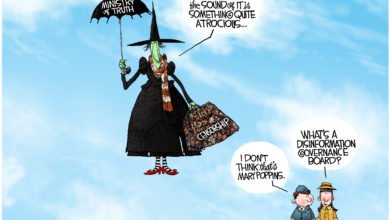California’s Economic Woes Are Way Worse Than We Thought

California’s economy has been increasingly struggling over the past several years as regulations, high taxes and poor governance have dampened business opportunities and sent citizens running, according to experts who spoke to the Daily Caller News Foundation.
The unemployment rate in California jumped to 5.3% in February, the highest out of any state and Washington, D.C., according to the Bureau of Labor Statistics. California employs some of the strictest labor laws, regulatory regimes and tax burdens in the nation, which has increasingly stifled economic growth and led businesses and citizens to flee, experts explained.
“You can look at the unemployment numbers, and those really flag some severe underlying problems,” Will Swaim, president of the California Policy Center, told the DCNF. “California overregulates businesses and underregulates public safety. And those two things may seem unrelated, but when you allow people to engage in organized theft from stores or break into cars, for instance, it reduces the ability of markets to function.”
Retail theft, such as shoplifting, has exploded over the past few years, mostly in cities like Los Angeles and San Francisco, according to The Associated Press. Criminals are incentivized through relaxed crime policies like Proposition 47, which was passed in 2014 and reduced certain theft and drug offenses from felonies to misdemeanors.
The state’s economy has only increased the number of jobs in the state by 82,000 in the last year as of February, with 61,100 of those being government positions, according to the California Employment Development Department. California’s struggling employment market puts it last in terms of job growth over the last year out of all other states and D.C., according to the Orange County Register.
“California job growth is struggling because of the state’s regulatory and tax policy,” Wayne Winegarden, senior fellow in business and economics at the Pacific Research Institute, told the DCNF. “The burdensome regulations on businesses discourage the formation of new businesses, which has been growing slower than the national economy. New businesses typically drive job growth, so fewer businesses forming is bad for job growth. Compounding these difficulties, burdensome labor regulations discourage those businesses that do exist from expanding hiring. The combination of the two reinforce one another, creating a difficult job growth environment.”
The state also has one of the highest tax burdens in the U.S., ranking fifth in 2020 with an effective average tax rate of around 13.5%, according to the Tax Foundation. California was only outdone by other blue states like Connecticut, New York and Hawaii.
“Policies such as expensive energy mandates, restrictive zoning regulations, high taxes, rent control, and high minimum wages all increase the cost of doing business and decrease families’ purchasing power,” Winegarden told the DCNF. “The higher cost of doing business makes California firms less competitive nationally, which harms economic growth. The affordability problems make it harder for families to thrive, encourage families to leave the state, and discourage new families from migrating to California. All of these trends reinforce one another, harming the state’s vitality.”
The state government is also struggling with a massive deficit, which California’s nonpartisan Legislative Analyst’s Office estimates would be a record $73 billion in 2024 under current fiscal circumstances. The huge deficit is in part due to a drop in income as people flee the state, with 27,000 tax filers with adjusted gross incomes of over $200,000 having moved out between 2020 and 2021.
The population of California declined by around 538,000 from July 2020 to July 2023 as residents flee blue states like New York and Illinois and head to places like Texas and Florida.
THE NOT-SO-GOLDEN STATEhttps://t.co/h6cF2HQtpy
— Daily Caller (@DailyCaller) March 22, 2024
Democratic Gov. Gavin Newsom boasted of a $97.5 billion surplus in May 2022, which the governor then pledged to spend on drought mitigation efforts, abortion initiatives and to address costs from inflation, despite the current surging deficit.
California has also spent around $30 billion on homelessness alone under Newsom since 2019, despite the number of homeless people continuing to rise year-over-year in the state. On a single night in January 2023, there were 181,399 homeless people in California, a jump of more than 30% since 2007, according to a report from the Department of Housing and Urban Development.
The state also has one of the highest minimum wages in the country at $16 per hour, with specific industries like healthcare and fast food getting to set even higher minimum rates, according to California’s Department of Industrial Relations. California is set to raise its minimum wage for fast food workers at chains to $20 an hour on April 1, which has already led to businesses needing to cut staff in preparation to keep labor costs manageable.
“The pandemic lockdowns here in California lasted far longer than they did anywhere else,” Swaim told the DCNF. “And so the hit on retail, and particularly independently owned retail, has been disastrous — you know, small restaurants, independent stores. A lot of these have really struggled to come back. And the tech industry is now continuing to shed jobs.”
The tech sector, which boomed and expanded during COVID-19 pandemic lockdowns due to stay-at-home orders pushingmore people online, is now having to lay off employees due to overextension, according to The Mercury News. Companies in the Bay Area, alone, cut more than 36,000 jobs in the tech industry from 2022 until early 2024.
Regulations in the state aimed at reducing carbon emissions and other environmental impacts have also weighed on several industries, particularly oil and gas companies. Chevron announced in early January that it was anticipating up to $4 billion in asset value reductions due to hostile attitudes toward oil production.
Climate initiatives also weigh on the state’s budget, including $600 million being spent on environmental reviews for a high-speed rail project 15 years after it was first approved.
“All of the activity on the employment side is embedded in this very hostile relationship between people who are very much in love with the idea of regulation and the people who have to live with that regulation, namely the businesses, of course,” Swaim told the DCNF.
The California governor’s office declined to comment on the record to the DCNF.
Content created by The Daily Caller News Foundation is available without charge to any eligible news publisher that can provide a large audience. For licensing opportunities of our original content, please contact licensing@dailycallernewsfoundation.org




